|
|
|
Sort Order |
|
|
|
Items / Page
|
|
|
|
|
|
|
| Srl | Item |
| 1 |
ID:
095996
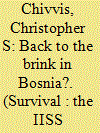

|
|
|
|
|
| Publication |
2010.
|
| Summary/Abstract |
Today in Sarajevo there is disturbing talk of an unravelling of the Dayton Accords that ended the bloody civil war there 14 years ago. Nearly 100,000 people were killed in that war, which pitted Muslims against Serbs against Croats, and saw Europe's nastiest massacres since the Second World War. Since 1995, Bosnia has been at peace, but the main political parties continue to fight over the basic issues that started the war almost two decades ago. Concern over the general political situation has increased as nationalist rhetoric has raised the spectre of a re-division of the country and an ensuing descent into violence. Some in Sarajevo even evoke the possibility of 'European Gazas' emerging in some parts of the county, where there are hints that unemployed Muslim youth may be coming under the influence of a radical, foreign brand of Wahhabist Islam.
|
|
|
|
|
|
|
|
|
|
|
|
|
|
|
|
| 2 |
ID:
096001
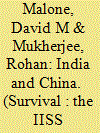

|
|
|
|
|
| Publication |
2010.
|
| Summary/Abstract |
Not much has changed in the rhetoric of Sino-Indian relations since Mao Zedong, speaking in 1951 in honour of the first anniversary of India's constitution, declared that 'excellent friendship' had existed between the two countries 'for thousands of years'. Yet few of the lofty proclamations made by Indian and Chinese leaders over the years truly reflect the reality of relations between the neighbours. It is surprising that two states with such a rich and sometimes fractious history, including a border conflict in 1962, should have what appears to be a largely reactive relationship. But neither has developed a grand strategy with regard to the other. An unshakeable and largely unprofitable preoccupation with the past on the Indian side, and an equally intense preoccupation with domestic consolidation on the Chinese side, have left the relationship under-tended. It might best be seen as one of geostrategic competition qualified by growing commercial cooperation. And there is some asymmetry: China is a more fraught subject in Indian national debates than India is for China. China does not appear to feel threatened in any serious way by India, while India at times displays tremendous insecurity in the face of Chinese economic success and military expansion.
|
|
|
|
|
|
|
|
|
|
|
|
|
|
|
|
| 3 |
ID:
095989
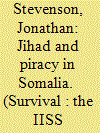

|
|
|
|
|
| Publication |
2010.
|
| Summary/Abstract |
Somalia's chronic governance and security problems started in 1991, when strongman President Mohammed Siad Barre was overthrown in a civil war. Competing clans then commandeered weapons supplied to his government alternately by the Soviets and the Americans during the Cold War, and proceeded to carve the country up into armed clan fiefdoms without central authority. Then came the famine that an ineffectual United Nations mission was unable to address, prompting the United States to lead an international military intervention in December 1992 with the relatively narrow intention of facilitating humanitarian relief, though in the grander service of a 'new world order'.
|
|
|
|
|
|
|
|
|
|
|
|
|
|
|
|
| 4 |
ID:
095991


|
|
|
|
|
| Publication |
2010.
|
| Summary/Abstract |
The sharp escalation in ship hijackings by Somali pirates on one of the world's most important trade routes, highlighted by the headline-grabbing seizures of the Ukrainian MV Faina, with its cargo of tanks and heavy weapons, in September 2008 and the fully laden Saudi-owned tanker Sirius Star two months later, shows little sign of abating. In November 2009, the European Security Forum at the Centre for European Policy Studies in Brussels, co-sponsored by the IISS, addressed the question of 'Somalia and the Pirates'. These three essays, offering a range of contexts for the new piracy, are shortened versions of three of the papers presented. A fourth, on Somali security issues more generally, appears elsewhere in this issue.
|
|
|
|
|
|
|
|
|
|
|
|
|
|
|
|
| 5 |
ID:
095998
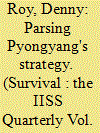

|
|
|
|
|
| Publication |
2010.
|
| Summary/Abstract |
North Korean behaviour that appears intended to raise tensions with Pyongyang's adversaries is not only vexing but puzzling. The North Koreans periodically throw up obstacles to the economic cooperation their country desperately needs, including harassment of the joint North-South industrial zone in Kaesong. Pyongyang often speaks as if it welcomes a fight with the United States and South Korea, its strongest potential adversaries. With its second nuclear test in May 2009, Pyongyang clearly angered even its important partner China, a major supplier of such basic needs as food and energy. If fear of aggression by the United States and its allies is a principal driver of North Korean foreign policy, why do the North Koreans frequently risk providing the putatively aggressive Americans further motivation to attack? Some observers argue, for example, that transfer of nuclear material or technology is extremely unlikely because Pyongyang is deterred from crossing what is clearly a red line for the United States that would bring massive military retaliation. Yet North Korean officials have more than once threatened to cross that line, seemingly for the purpose of frightening the Americans by playing on one of their worst fears.
|
|
|
|
|
|
|
|
|
|
|
|
|
|
|
|
| 6 |
ID:
095994
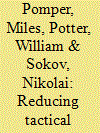

|
|
|
|
|
| Publication |
2010.
|
| Summary/Abstract |
US and Russian leaders have indicated that the next round of US-Russian strategic arms negotiations, after a START follow-on treaty is agreed and ratified, is likely to tackle non-strategic, or 'tactical', nuclear weapons. Control of such weapons has remained elusive, despite the fact that they are particularly attractive to terrorists and present a greater risk than strategic weapons of early or accidental use. In 1991, US President George H.W. Bush and Soviet President Mikhail Gorbachev made parallel, but unilateral, pledges - collectively known as the presidential nuclear initiatives - to reduce the numbers of their tactical nuclear weapons and store the larger part of their arsenals in central storage (which was not defined). Washington, however, did not accept a Soviet proposal made that autumn to negotiate a legally binding, verifiable treaty. The two countries have made much progress towards meeting their initiative commitments, but there have been no further serious negotiations on the issue despite many rounds of strategic arms reduction talks. The intention of US and Russian officials to finally tackle the issue of tactical nuclear weapons is welcome, yet linking the two classes of nuclear weapons at an early stage in the next round of post-START negotiations might result in more problems than it can solve.
|
|
|
|
|
|
|
|
|
|
|
|
|
|
|
|
| 7 |
ID:
095992


|
|
|
|
|
| Publication |
2010.
|
| Summary/Abstract |
At all times the survival of the empire and the maintenance of its territorial integrity were the paramount priorities for Russia's rulers, before which national, religious, economic and other priorities invariably yielded.' So wrote British historian Geoffrey Hosking in his history of the Russian Empire. These priorities remain paramount for Russia's leaders today. During a trip to the Russian Far East in 2008, President Dmitry Medvedev warned that Russia could 'in the end lose everything' quite unexpectedly in the region, pointing to the collapse of the Soviet Union as a cautionary tale. Several years earlier, then President Vladimir Putin voiced similar concerns on a trip to the same region. The Russian Far East has not been the only source of anxiety, however. Putin relaunched a brutal war against separatism and terrorism in Chechnya, which he saw as a grave threat to Russia. Despite official claims of having successfully dealt with Chechnya, escalating violence in the North Caucasus today (particularly in two of Chechnya's immediate neighbours, Ingushetia and Dagestan) is clear evidence of a continuing threat.
|
|
|
|
|
|
|
|
|
|
|
|
|
|
|
|
| 8 |
ID:
096004
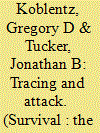

|
|
|
|
|
| Publication |
2010.
|
| Summary/Abstract |
On 18 September 2001, exactly one week after the 11 September terrorist attacks in the United States, five letters containing dry powdered spores of Bacillus anthracis - rugged, seed-like forms of the bacterium that causes anthrax - were mailed to media outlets in Florida and New York City. Three weeks later, two more letters containing a more refined preparation of anthrax spores were sent to US Senators Tom Daschle and Patrick Leahy in Washington DC. The tainted letters contaminated several buildings and caused 22 cases of anthrax (half involving the skin and half the lungs) in five states and the District of Columbia. Five of the people who contracted the inhalational form of anthrax died: two US Postal Service employees in Washington; an employee of American Media, Inc. in Boca Raton, Florida; a 94-year-old woman in Oxford, Connecticut; and a hospital worker in New York City. The anthrax letter attacks also had pervasive ripple effects, forcing thousands of people to take antibiotics as a precaution, disrupting the US Postal Service, temporarily shutting down the US Senate, causing nationwide anxiety about the safety of the mail, and triggering a flood of false alarms and hoaxes involving white powders. All told, the cost of the incident was estimated at $6 billion.
|
|
|
|
|
|
|
|
|
|
|
|
|
|
|
|
|
|
|
|
|